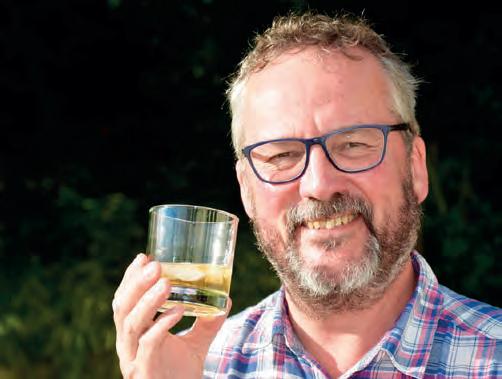
16 minute read
Obituaries
ALUN HUW MATHIAS (OC 1929 – 1938)
Born on July 1st 1919 at Aber Farm near Talybont-on Usk in Wales Alun was the middle child to parents Evan and Muriel, with an older brother Roland (who also went to Caterham) and younger sister Dilys. Their father was a Congregational Chaplin, and Alun’s early years were spent in Germany where his father served as a Chaplin with the British Occupation Forces after the First World War. He returned with his family and settled for a time in Salisbury before being posted to Catterick and living in Richmond North Yorkshire. Alun’s was a happy childhood together with his siblings.
Advertisement
At Caterham he excelled at sport and played regularly for the school’s first rugby team as well as in hockey and in 1936 was also a Prefect. Alun also did well at academic work because after leaving school he went to Jesus College, Oxford to study Politics, Philosophy and Economics but the outbreak of World War II meant that he did not take his finals. Although asked to go back after the war to take them he declined because by that time he had moved into agriculture. Alun began working for Harry Hawes on his farm where he also met Harry’s daughter Dorothy who was to become his wife of 64 years. They were married by Alun’s father in 1943 in a small ceremony in Moreton-in-Marsh.
Alun always maintained that his time at Caterham School was better than University. Rugby Union was his true sport and after leaving school continued to play the game until his late thirties and became a renowned player and captain at the local Stow Rugby Club. Upon retiring from the game he continued to avidly watch matches, until nearly the end, on both television and in person.
Farming was his life and he became well respected by his contemporaries as both a practitioner and ambassador. He was always greeted with warmth at market and local shows and was often invited to judge the horses and cattle as well as successfully competing himself. In his late forties he was the Warwickshire County NFU Chairman, a reflection of his success and respect in the industry at a time of great change. A stalwart in the community Alun was also a popular local councillor in Shipston during the 1960’s before resigning after refusing to join a political party as required when Shipston merged with Stratford Council.
Alun moved to a smaller farm at Northleigh, near Oxford, before finally retiring to a bungalow in Stonesfield, where he cared for his wife in her declining years. Following her death he moved to Awre and lived with his youngest daughter in an annex to their house.
Alun died peacefully on May 13th 2018 (which incidentally is the birthday of his late father in law). At his brother’s funeral he turned and said “I did not realise that I was related to someone who was so successful”. Although he was in a different profession he was probably as successful as his brother. He will be cross to have been bowled out just over a month from his 99th birthday and for not making his century. ■
DR JOHN ROLAND SHAKESHAFT (OC 1939 – 1947)
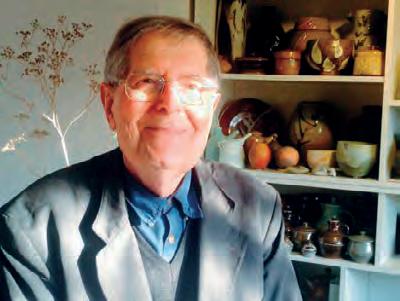
We are sad to announce that Dr John Shakeshaft died on Monday 6 July 2015.
Following his years at Caterham, John completed his undergraduate degree, PhD, and Research Fellowship in Electrical Engineering at St John’s College, Cambridge, before being elected to the St Catharine’s Fellowship in 1961 as one of around sixteen Fellows. He specialised in radio astronomy and was one of the key researchers working in this field, particularly during the 1950s and 1960s.
As well as his professional career as a radio astronomer, John was an avid collector of pottery, especially 20th century Studio pottery, of which he bequeathed his sizeable collection to the Fitzwilliam Museum. His philanthropic spirit led him to support a number of charities with which he was associated.
Caterham School is grateful to Dr John Shakeshaft for his generous bequest to the school. ■
LT. COL. JOHN PHILIP CHUTTER, MBE (OC 1935 – 1936)
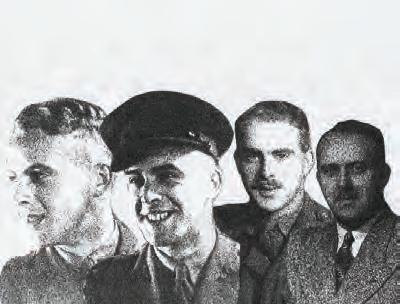
John was born in Vancouver BC in 1929, but his father, Thomas was the second of four brothers: born in South London but went to Canada before WWI, and returned to fight in the war, and received the Military Cross for his efforts at Passchendaele. Later he was severely wounded by shrapnel in his shoulder and was sent to the Canadian Army Hospital in Bramshott (England) where he met Clover, his future wife. After the war Thomas returned to Canada and hence John was born there.
He was named John (and nicknamed ‘Johnny’) after his mother, Clover, who was nicknamed ‘Johnny’ after the whiskey ‘Johnny Walker’. His middle name, Philip, was after his late Uncle Philip (3rd brother), who was killed in action on the Italian Front in June 1918. Incidentally the 4th brother James Bernard, born 1905, also went to Caterham.
He grew up in British Columbia, but when the great depression hit the family hard they returned to England in 1934 and settled in Sanderstead and ran ‘Boro Farm’ (a riding stable). Hence, John came to Caterham for only a couple of years.
John then joined the Civil Service in London. However, in advance of WWII, and before Johnny was 19 years old, both Johnny and Tommy had signed up with the British Army, as the Canadian Army would not form in England for another year, and neither wanted to wait.. After Officer Training School he joined the Royal Warwickshire Regiment (Monty’s Regiment), Battalion 1. During the early part of the war he was a Sapper – part of the bomb brigade, responsible for defusing unexploded V1s, V2s and other bombs. During this time he met Winston Churchill who attended an army training event and even participated in firing the weapons being fired by dad’s troops. To the end he belonged to the Churchill Society; and recounted that Churchill was the best leader of all time, and that they don’t make leaders like that anymore. Johnny married his first wife Betty before being sent to India to train and prepare the Indian Army and Gurkhas to fight the Japanese. At one time, he spoke pretty good Urdu, and loved a good hot curry all his life. In India he had to arrest both Nehru and Gandhi on different political occasions.
After the war both Johnny and his father, Tommy (as Town Mayor) were stationed in Bad Oeynhausen, Germany. Johnny was billeted at the local British Army Hotel, mostly for soldiers on leave, run by a young German woman who was assigned by the army to assist him in getting familiar with the area, as she spoke fluent German, English French and Russian. Her name was Ellen Hentschel. Both fun seeking their relationship almost didn’t work out when Ellen found out that Johnny was already married. They eventually married in 1951.
Johnny graduated from Camberley Staff College in 1953. He then went to Egypt to help oversee the operation of the Suez Canal. The family moved six times while stationed in Egypt, and four more times to Cypress, twice within Northern Ireland (Omagh & Ballykinlar); and then, briefly, back to England.
He was then posted to Hong Kong in 1958 and seconded to 48th Gurkha brigade. In late 1960, Johnny broke his leg very badly and returned to England to convalesce. He was then seconded to Nigerian Army and in 1963 returned to England to work at the Ministry of Defence.
In 1965 he was again posted to Hong Kong. While there, in 1966, Johnny retired from the army and became Chief Staff Officer of the Hong Kong Government’s Civil Aid Service, which was responsible for emergency preparedness and actions for damage caused by typhoons and other disasters.
In 1972 after 38 years he returned to live in Vancouver and bought his very first house, and took the job of Manager (Secretary) of the elite gentleman’s club, ‘The Vancouver Club’.
Johnny married his 3rd wife in 1976, and after finally retiring from the Club in 1986 he became active in the Churchill Society, Burma Star, ran Bridge clubs, and did a lot of stamp collecting, gardening and piano playing. After many years of marriage his 3rd wife suddenly died in 1995. His first wife in England was still alive until 2015, and his second wife died in 2005.
John played A Level squash throughout his adult life, representing Hong Kong, and well into his 70’s at B Level.. His Bridge playing lasted until he was 95. He took over a stamp collection (started by his grandfather) from his father as he felt that his father wasn’t very good at it and was trading valuable old stamps for ‘pretty’ ones. John collected the entire British Commonwealth plus the USA. He had copies of every stamp ever issued by England up to 2000 and also virtually every different version of each stamp listed in the Stanley Gibbons catalogue (e.g., he has several pages of penny reds and penny blacks, each with subtle differences in dyes, perforations, corner coding, water marks, etc).
John received an MBE from the Queen’s hand, in 1964, at Buckingham Palace. He also received the Burma Star. His aim was to become the oldest living member of the Chutter family and live to 103 so as to overtake his eldest Uncle Gordon who made 102 years and 10 months. He didn’t make it as he died on September 13th, 2018, aged 98. ■
Written by Peter D Chutter (3rd Generation OC 1953 – 1960)
Note: It was mentioned in Omnia issue 4 that John M Halstead was the oldest living Caterhamian. This might not be true in light of the above.
THE REV’D CANON PETER CLIVE EDWARDS (TEACHER 1976 – 1983)
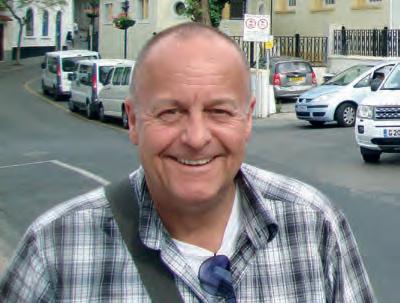
Peter Edwards taught at Caterham School between 1976 and 1983. He was an extremely active member of staff as an English teacher, the first Head of General Studies which he successfully established in the Sixth Form Curriculum, and Assistant Headmaster of Lewisham. Outside the classroom, he was fondly remembered for his imagination and enthusiasm in the drama department producing many school plays and revues in his time at Caterham. In 1983 he began ordination training at St Stephen’s House and was ordained deacon in 1985 and priest in 1986 in the Diocese of Southwark. Peter served his title at St Augustine’s, Lee in Grove Park before moving to Christ the King, Salfords where he was vicar from 1990 – 1997. In 1997 he moved to St Mary’s, Newington before moving to Spain in 2003. After a short sabbatical rest, he took up a post in 2004 as chaplain in the team in the Parish of the Holy Spirit, Costa Blanca, and became senior chaplain in 2009. In 2012 Peter was made a canon of Gibraltar Cathedral. He retired in 2015. The chaplaincy team writes: “Under his proficient pastoral oversight as Senior Chaplain he nurtured a warm, open, accommodating and gently Catholic expression of Church life across the eight congregations of the chaplaincy. With this he combined gifts of meticulous pastoral care, a sense of humour and a confident, no nonsense approach to Church life. He was warmly accepted and appreciated as a colleague by the local Roman Catholic clergy and did much to deepen ecumenical relations in Costa Blanca.” Peter had many friends around the world and will be remembered both as a caring and loving person who sought out the vulnerable and weak, and also as a strong-minded person who was a great advocate for catholic teaching and order. He was committed to bringing people to a personal faith in Christ and was the Spiritual Director of Southwark Anglican Cursillo from 2000 – 2004 and was equally committed to the ordination of women to the priesthood, being involved in the early 90’s with the founding of the Society of Catholic Priests. He will be remembered by his friends and family as a loyal friend, an entertaining colleague and a faithful priest of many years. His embrace of modern technology did not dissuade him from regular hour-long telephone calls during which he was able to recount stories and happenings in the most entertaining and sometimes extraordinarily detailed way – he was a master of the English language and a great storyteller. Peter was much loved by his stepmother Shirley, with whom he had an easy, happy and companionable relationship and his cousin Mary and his nephews and nieces and his life-partner Ian with whom he lived in Spain. Peter died on Friday 4th May 2018 aged 68. May he rest in peace and rise in glory. ■
This obituary incorporates the announcement featured in The Telegraph.
IN MEMORIAM
David Bennett
(OC 1968 – 1974)
Tim Healy
(OC 1977 – 1984)
Malcolm Naysmith
(OC 1948 – 1955)
Ronald Saltmarsh
(OC 1943 – 1948)
DAVID OWENS (OC 1942 – 1948)
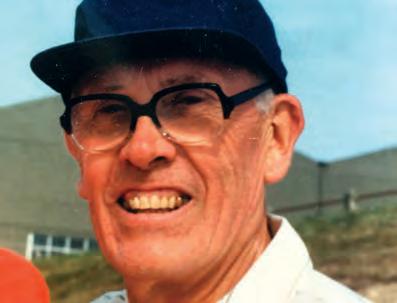
David Owens 29th November 1930 – 20th October 2018
David recalled happy memories of school particularly a day in early June 1944 when the Harestone Valley Road was filled with American vehicles waiting to cross the channel for D-Day when he gratefully received some drinking chocolate powder from a generous American soldier. Chocolate was rationed then so it was something which always stuck in his mind!
Interested in radio at school he made a one valve receiver and after national service with the RAF, he joined the BBC.
With the advent of commercial television he joined Southern Television in Southampton as a Sound Supervisor in their outside broadcast department and then continued with TVS television retiring in 1990.
One special moment of retirement was crossing the English Channel in his 10 foot long speedboat Apollo arriving into Calais harbour waving an orange duster shouting ‘nothing to declare’.
He was an active member of The Hovercraft Museum in Lee On The Solent, the local Scout group and the Gosport United Reformed Church.
His funeral was well attended with over 200 people and the wake was held at the Royal Navy Submarine Museum in Gosport. This photo was taken at the museum during the wake featuring the submarine Alliance with David’s speedboat in the foreground. ■
JIM UNDERWOOD (OC 1950 – 1958)
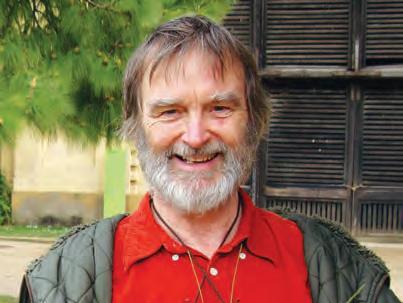
Jim Underwood, who has died aged 78, was a varied, thoughtful and intelligent translator, whose work was published under the name JA Underwood.
From the early 1970s until his death, he was one of the key figures in bringing to a wide audience many remarkable works of French and German literature. I was lucky enough to commission two of his translations for Penguin Classics: Walter Benjamin’s One-Way Street and Other Writings, and Grimmelshausen’s novel Simplicissimus, the latter a mass of 17th-century military argot, puns and violent slapstick, all of which he handled with aplomb. He lived just long enough to enjoy his translation’s marvellous reviews. Jim was born in Catford, SouthEast London, the son of James Underwood, a Canon of Southwark Cathedral, and his wife. Aagot (née Borge), who was Norwegian. He attended Mottingham County Primary, then Caterham School, in Surrey, and took a history and English Literature degree at Trinity Hall, Cambridge.
Jim worked for the publishers Constable & Co and Calder and Boyars in the 60s as an assistant editor. He already spoke French, but deepened his knowledge through living in Paris for two years. He became a freelance translator, and, living for a time in Switzerland, learned German at evening classes. He also learned to speak fluent Swiss German dialect.
Returning to the UK in 1976, he continued to make a living from translation, based at his home in Winchelsea Beach, then Pett Level and Fairlight, East Sussex. He worked with many of the leading publishers who Transmitted European literature into a sometimes baffled Englishspeaking world, including Marion Boyars, Berg and Overlook Press.
His Kafta translations were widely praised and he won the Schlegel-Tieck prize in 1998 for The Castle. He was the translator of Elias Canetti’s Voices of Marrakesh and Julian Green’s Paris.
He also translated two volumes in the New Penguin Freud. He was exasperated at The Interpretation of Dreams – in his view a wholly botched rendering of what he called interpreting Dreams. He once wrote: “A translator’s rule of thumb might be to seek to carry as much of the original across to the reader of then target language as is compatible with an equivalent level of readability. Try to carry too much and the vessel founders;jettison too much and you are cheating the consignee.”
Jim’s love of history, art, music and literature flowed into his work, including many art books, as well as a biography of Bismarck and an edition of Gabriel Fauré’s letters. One of his first was Jawlensky: Heads, Faces, Meditations (1971), co-translated with his first wife, Edith Küstner, whom he married in 1969. They divorced in 1980.
He is survived by his second wife, Annie Soudain, an artist, whom he married in 1981, his children from his first marriage, Evelyn, Julian and Oliver, his stepchildren, Sara, Jo and Zac, and seven grandchildren. ■
Written by Simon Winder, The Guardian
DAVID C. PECK (OC 1943 – 1951)
David sadly passed away on Wednesday 20 June 2018 in Salisbury Hospital, he was 85 years old. He enjoyed his school years at Caterham School immensely and remained a proud Old Caterhamian. He excelled in English and languages, which proved useful in later life as he managed Rubber Plantations in Malaysia; but after returning to England in 1964, he worked in horticulture as an apple and soft fruit grower and arable farmer.
David was a keen cricket player and was rather good, he played for the School as well as for his village club at Woldingham where his parents’ farm was located and cricket would remain a lifelong passion. In memory of David, his family have planted a Native Hornbeam tree by the school cricket pitch. ■
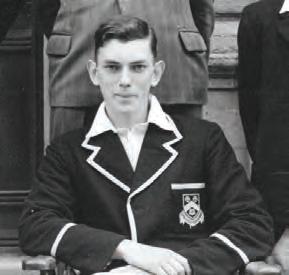
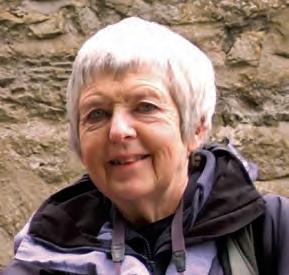
GILLIAN HARRIS (OE 1963)
Gillian sadly passed away on 1 June 2018 after a long illness, a form of dementia which led to gradual deterioration over the past six years. As Gillian DaviesJones she had been Head Girl of Eothen. She was sister of Clare Davies-Jones (married name Gaustad), and daughter of Arthur DaviesJones, Deputy Head of Caterham School in the 1960s. She had been an excellent teacher in both the secondary and primary phases, most recently giving imaginative support to pupils at risk of dropping out of secondary school. For about 10 years in the 1990s she had been the Advisor for Teacher In-Service Training in north-west Kent. Her mission was to teach children and adults to learn and to develop ideas creatively together and everyone agrees that she did that very well. ■







